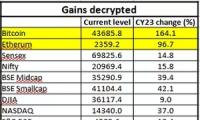Crypto TDS && Losses: How India Can Boost Exchanges
Pi42 CEO advocates for lower TDS on crypto transactions and allowing loss adjustments to boost Indian crypto exchanges and tax revenue. Learn more about the impact of current regulations.
Ahmedabad, Jun 25 (PTI) Cryptocurrency exchange Pi42 co-founder and CEO Avinash Shekhar on Tuesday said lowering TDS and allowing losses to be adjusted against profits would not only boost trading volumes for Indian crypto exchanges but also increase tax revenues as investors will shift to domestic bourses from offshore ones.
Speaking with reporters here, Shekhar said the Indian exchanges are hopeful that the Centre would take into account the requests of domestic crypto exchanges and bring in necessary changes during the union budget.
Shekhar in February co-founded 'Pi42', India's first Crypto-INR Perpetual Futures Exchange, which is outside the TDS net for being a 'futures' exchange.
After the government imposed 1 per cent TDS on spot crypto transactions, volumes of Indian exchanges came down as traders moved to international exchanges which are beyond the compliance net, said Shekhar.
"Trading in Indian cryptocurrency exchange has reduced due to TDS rule. People are now trading more on foreign exchanges. Government's objective was to control this activity to an extent and bring transparency and visibility, like who is doing what. But that objective is not fully met. Foreign exchanges are not providing information to the government," he said.
If Indian exchanges are handling a trade of Rs 100, international exchanges are doing trade of Rs 500 to Rs 1,000, nearly five to ten times more than Indian exchanges, he said, adding that even customer protection laws cannot be enforced on international exchanges operating from outside India.
He said there are three major issues which are adversely affecting our business and exchanges have conveyed this to the government also.
The first major issue is 1 per cent TDS levied on each spot transaction, he said.
"If a trader does 10 transactions of Rs 1 lakh each, he will have to pay Rs 10,000 as TDS and it will be refunded may be after a year. So your entire capital gets blocked after a few transactions in a month and you will not be able to trade further. So the biggest hindrance is 1 per cent TDS," he said, adding that the government introduced TDS with an aim to ensure reporting and track activities.
"So what we are recommending is that information will reach the authorities even with 0.1 per cent TDS instead of 1 per cent. TDS of 0.1 per cent will further enhance market efficiency and it will stop migration of investors to overseas exchanges. Low TDS will also increase government revenue because investors will choose Indian exchanges over international ones" he said.
"Another issue is that the government does not allow set off of losses. If you gain Rs 100 in one trade and lose 60 in another. Generally, in stock exchanges, you are supposed to give tax on the remaining profit of Rs 40. But, here the government ignores the losses and asks us to pay 30 per cent tax on the profit of Rs 100. So instead of profit, you end up losing money after paying tax," he said.
He said though 30 per cent tax on crypto gain is also an issue, it is not as big as the first two issues. However, Shekhar said the Centre can think of lowering the rate.
"India has nearly 8 large crypto exchanges while five to six international exchanges are also active in the country. TDS is not deducted if a transaction is done through an international exchange. That is why most of the trades are taking place in offshore exchanges. If these three issues are resolved, the business would eventually shift to India" said Shekhar.
Speaking with reporters here, Shekhar said the Indian exchanges are hopeful that the Centre would take into account the requests of domestic crypto exchanges and bring in necessary changes during the union budget.
Shekhar in February co-founded 'Pi42', India's first Crypto-INR Perpetual Futures Exchange, which is outside the TDS net for being a 'futures' exchange.
After the government imposed 1 per cent TDS on spot crypto transactions, volumes of Indian exchanges came down as traders moved to international exchanges which are beyond the compliance net, said Shekhar.
"Trading in Indian cryptocurrency exchange has reduced due to TDS rule. People are now trading more on foreign exchanges. Government's objective was to control this activity to an extent and bring transparency and visibility, like who is doing what. But that objective is not fully met. Foreign exchanges are not providing information to the government," he said.
If Indian exchanges are handling a trade of Rs 100, international exchanges are doing trade of Rs 500 to Rs 1,000, nearly five to ten times more than Indian exchanges, he said, adding that even customer protection laws cannot be enforced on international exchanges operating from outside India.
He said there are three major issues which are adversely affecting our business and exchanges have conveyed this to the government also.
The first major issue is 1 per cent TDS levied on each spot transaction, he said.
"If a trader does 10 transactions of Rs 1 lakh each, he will have to pay Rs 10,000 as TDS and it will be refunded may be after a year. So your entire capital gets blocked after a few transactions in a month and you will not be able to trade further. So the biggest hindrance is 1 per cent TDS," he said, adding that the government introduced TDS with an aim to ensure reporting and track activities.
"So what we are recommending is that information will reach the authorities even with 0.1 per cent TDS instead of 1 per cent. TDS of 0.1 per cent will further enhance market efficiency and it will stop migration of investors to overseas exchanges. Low TDS will also increase government revenue because investors will choose Indian exchanges over international ones" he said.
"Another issue is that the government does not allow set off of losses. If you gain Rs 100 in one trade and lose 60 in another. Generally, in stock exchanges, you are supposed to give tax on the remaining profit of Rs 40. But, here the government ignores the losses and asks us to pay 30 per cent tax on the profit of Rs 100. So instead of profit, you end up losing money after paying tax," he said.
He said though 30 per cent tax on crypto gain is also an issue, it is not as big as the first two issues. However, Shekhar said the Centre can think of lowering the rate.
"India has nearly 8 large crypto exchanges while five to six international exchanges are also active in the country. TDS is not deducted if a transaction is done through an international exchange. That is why most of the trades are taking place in offshore exchanges. If these three issues are resolved, the business would eventually shift to India" said Shekhar.
You May Like To Read
TODAY'S MOST TRADED COMPANIES
- Company Name
- Price
- Volume
- Vodafone-Idea-L
- 11.65 (+ 3.56)
- 106772451
- Alstone-Textiles
- 0.28 ( -3.45)
- 44187760
- Mangalam-Industrial
- 0.88 ( -2.22)
- 39177573
- Sunshine-Capital
- 0.27 (+ 3.85)
- 35956340
- GMR-Airports
- 104.40 (+ 6.37)
- 30453005





